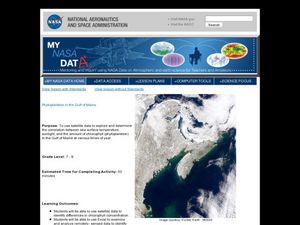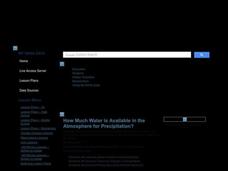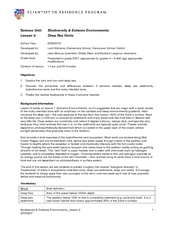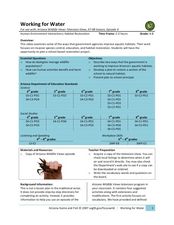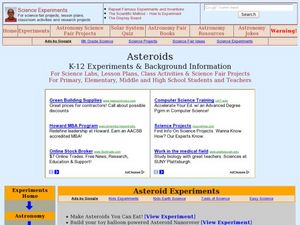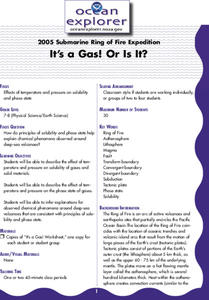Curated OER
Beowulf: Songs of Ancient Heroes
Introduce your class to epic heroes with these activities for Beowulf. After watching a video clip, taking notes on heroes, and tracking characteristics of heroism throughout Beowulf, class members retell an episode of Beowulf using a...
Curated OER
Friendly Volcanoes
Students discuss the benefits of volcanic activity on marine life. They explain the process of tectonic plates.
Curated OER
Phytoplankton in the Gulf of Maine
Students use satellite data to see the correlation between sea temperature and sunlight in the Gulf of Maine. In this phytoplankton lesson students use Excel to analyze data.
Curated OER
How Much Water is Available in the Atmosphere for Precipitation?
Students explore the relationship between the amount of water in the atmosphere available for precipitation and the actual precipitation observed by satellite. They examine seasonal changes in precipitation. They practice using Internet...
Curated OER
Rock of Ages
Students are given a classification table and samples from their location. They locate their samples on the classification table using the characteristics used in rock identification.
Curated OER
Deep Sea Vents
Students study the vent and non vent deep sea and see the differences in habitats. In this investigative lesson plan students complete a worksheet and work in groups.
Curated OER
Protecting Our Planet
Students examine the impact of pollution. In this pollution lesson, students watch Protecting Our Planet, then participate in a simulation of the effect of pollution on a variety of organisms.
Curated OER
Greenhouse Gases: The Chemistry Behind the Culprits
Ninth graders investigate the effect of different gases in the atmosphere. In this chemistry lesson, 9th graders explain how these gases contribute to global warming. They suggest possible solutions to this growing problem.
Curated OER
Trees and Erosion
Students examine the connection between trees and erosion. In this erosion activity students experiment with the effects of rain on a hillside. Students investigate the number of trees and the amount of erosion.
Curated OER
Geology of Yosemite
Students are shown slides of Yosemite and explore how the valley was formed by performing an experiment. Instructions on how to set up the lab are included. They can be assessed orally or by writing a report on the outcome of the lab.
Curated OER
Creating and Analyzing Graphs of Tropospheric Ozone
Students create and analyze graphs using archived atmospheric data to compare the ozone levels of selected regions around the world.
Curated OER
Civilizations of the Americas
Study and compare multiple aspects of both Aztec and Inca civilizations. Young historians explain how each of the empires came to be, and how they were both defeated by the Spanish. The resource starts out as a good lesson, but is...
Curated OER
Avalanche
Young scholars investigate the concept of avalanches and how they effect people who use the slopes. They conduct research using multiple resources that includes the internet in order to create a final oral presentation.
Curated OER
Water Cycle and Ecosystems
Students explore the water cycle. For this investigative lesson, students examine the water cycle process. They will record their observations and discuss marine and freshwater ecosystems.
Curated OER
Working for Water
Learners examine the ways that government works to help improve aquatic habitats. In this water habitats activity students view a video and plan a school restoration project.
Curated OER
Asteroids
Young scholars examine a potential asteroid impact site. They describe evidence and theories for extinction events.
Curated OER
Relative Dating - Telling Time Using Fossils
Students use fossil range charts to explain relative dating. They graph for ammonites, marine organisms that went extinct at the same time as dinosaurs.
Curated OER
A Hydrothermal Adventure
Students analyze hydrothermal vents. In this hydrothermal vents instructional activity, students discover the effects of hydrothermal vents on tectonic plates. Students make model hydrothermal vents to understand how they form and operate.
Curated OER
Why Do We Need Petroleum?
Students learn the many ways petroleum is used in our industrial society, and the advantages and disadvantages of its use. They explore what it would be like to live in a world without petroleum.
Curated OER
Sea Surface Temperature Trends of the Gulf Stream
Students use authentic satellite data to produce plots and graphs of sea surface temperature as they explore the seasonal changes of the Gulf Stream.
Curated OER
Sea Surface Temperature Trends of the Gulf Stream
Students explore the importance of the Gulf Stream. Using a NASA satellite images, they examine the sea surface temperature. Students collect the temperature at various locations and times. Using spreadsheet technology, they graph the...
Curated OER
It's a Gas! Or is it?
Students discover the principles of solubility and phase state and their influence on chemical phenomena observed around deep-sea volcanoes. They describe the effect of temperature and pressure on solubility of gasses and solid materials.
Curated OER
What does AG have to do with me?
Students practice alphabetizing while categorizing sources of basic agricultural products. They discuss agricultrual products, discover where they are grown and draw a simple agricultural scene on poster board.




